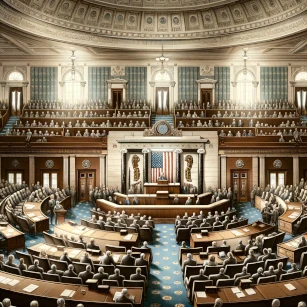When the United States government was born in 1789, it was like a newborn baby—full of potential, but with plenty of growing pains ahead. Picture a crying infant swaddled in red, white, and blue, trying to figure out how to crawl before it could walk. The Founding Fathers, acting like sleep-deprived parents, quickly realized they needed someone to keep order in the noisy nursery of Congress.
Table of Contents
Part Baby-Sitter, Part Referee
Enter the Speaker of the House: part babysitter, part referee, tasked with making sure the new democracy didn’t throw a tantrum every time someone disagreed. From its early days, the Speaker’s job has been to bring a sense of structure to the chaos—no easy feat when the “baby” was just learning to walk and talk in the language of freedom.
What is the Speaker of the House’s Job?
The Speaker of the House is the leader of the U.S. House of Representatives. Elected by the members of the House, they are responsible for leading debates, organizing the legislative agenda, and making sure the rules are followed during discussions. The Speaker is a member of the majority party and helps guide the party’s goals. This role is critical in managing the flow of legislation and maintaining order in the House.
History of the Speaker of the House
The role of Speaker was established in 1789, inspired by the Speaker of the British House of Commons. The Founders saw the need for a leader to preside over the House and keep the legislative process organized. Article I, Section 2 of the U.S. Constitution requires that the House elects its Speaker, giving them authority over legislative business. Over time, the position grew in power, becoming one of the most influential roles in U.S. politics.
One early example of the Speaker’s power occurred during the Civil Rights era. Speaker Sam Rayburn, who served from 1940 to 1961, played a pivotal role in advancing civil rights legislation. He worked behind the scenes to manage divisions within the Democratic Party, some of whom were opposed to civil rights reforms. Rayburn’s ability to unite factions and guide the legislative process during this turbulent time demonstrates the Speaker’s influence over national policy.
What are the Roles of the Speaker of the House?
- Presiding over the House: The Speaker leads the House sessions, making sure debates follow the rules. They also open and close sessions and decide who can speak.
- Setting the Legislative Agenda: The Speaker works with other leaders to determine which bills will be debated and voted on. This gives them great control over what laws are prioritized.
- Voting and Legislation: Although the Speaker rarely votes, they can do so to break ties. They also sign bills passed by the House before sending them to the Senate.
- Appointing Committee Members: The Speaker appoints members to key committees, which review and amend bills. They can also select committee chairs, who have a major say in legislative discussions.
- Ceremonial Duties: The Speaker represents the House in official events, such as receiving foreign leaders or attending state functions. They also announce important House decisions to the public.
- Line of Succession: The Speaker is second in line to become President, after the Vice President. This role makes the Speaker a key figure in national security planning.
The First Woman Speaker of the House

Pelosi was the first woman to serve as Speaker and held the position twice, overseeing key legislation like the Affordable Care Act during her first term and the impeachment of President Donald Trump during her second.
First Term: January 4, 2007 – January 3, 2011 (110th and 111th Congresses)
Second Term: January 3, 2019 – January 3, 2023 (116th and 117th Congresses)
In 2007, Nancy Pelosi made history by becoming the first woman to be elected Speaker of the House. Her election broke a major barrier in U.S. politics, making her one of the most powerful women in the country. Pelosi’s tenure as Speaker has been marked by her leadership during significant moments in U.S. history, including the passage of the Affordable Care Act in 2010. Additionally, Pelosi presided over two impeachment trials of President Donald Trump in 2019 and 2021. Her influence demonstrates how the Speaker can shape not only legislation but also historical events.
The Speaker and the “Contract with America”
Gingrich was known for his “Contract with America,” which helped the Republican Party win control of the House in 1994. His leadership was marked by significant legislative reforms and political controversy, including his role in President Bill Clinton’s impeachment proceedings.
Term: January 4, 1995 – January 3, 1999 (104th and 105th Congresses)

In 1994, Speaker Newt Gingrich used his leadership position to introduce the “Contract with America,” a sweeping set of policy proposals that aimed to cut taxes, reform welfare, and reduce government regulation. Gingrich’s plan helped the Republican Party regain control of the House for the first time in 40 years. His tenure is remembered for implementing bold reforms and reshaping the legislative agenda in the 1990s. Gingrich’s use of the Speaker’s platform to drive such a significant political movement is a prime example of the Speaker’s ability to influence the nation’s direction.
Conclusion
The Speaker of the House is not just a political figurehead. They play a central role in shaping the laws of the country and leading one of the most important institutions in American government. With their ability to manage debates, set legislative priorities, and represent the House, the Speaker’s responsibilities have a lasting impact on the nation. As history has shown, Speakers like Sam Rayburn, Nancy Pelosi, and Newt Gingrich have all used their roles to guide the country through pivotal moments, demonstrating just how powerful the office can be.
Frequently Asked Questions
- How is the Speaker of the House elected?
- The Speaker is elected by the members of the U.S. House of Representatives. Typically, the candidate from the majority party is chosen, and a simple majority vote is needed to win the position.
- Can the Speaker of the House vote on legislation?
- Yes, although the Speaker usually does not vote, they can if they choose. They often vote only in significant situations or to break a tie.
- What happens if the Speaker of the House resigns or is unable to perform their duties?
- If the Speaker resigns or can no longer fulfill their duties, the House holds a new election to choose a replacement. In the meantime, an acting Speaker may take over certain responsibilities.
- Has a Speaker of the House ever become President?
- No Speaker has ever directly become President. However, since the Speaker is second in line for presidential succession, they would assume the presidency if both the President and Vice President were unable to serve.
- Does the Speaker have to be a member of Congress?
- Technically, the U.S. Constitution does not require the Speaker to be a sitting member of Congress. However, every Speaker in U.S. history has been a member of the House.
Reference Material Used:
- National Archives, “The U.S. Constitution – Article I” – https://www.archives.gov/founding-docs/constitution
